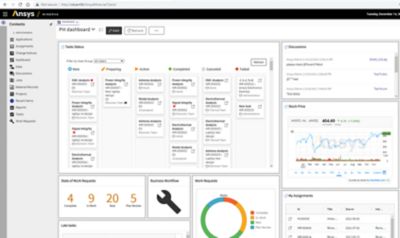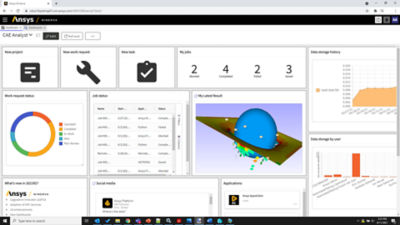-
United States -
United Kingdom -
India -
France -
Deutschland -
Italia -
日本 -
대한민국 -
中国 -
台灣
-
Ansys si impegna a fare in modo che gli studenti di oggi abbiano successo, fornendogli il software gratuito di simulazione ingegneristica.
-
Ansys si impegna a fare in modo che gli studenti di oggi abbiano successo, fornendogli il software gratuito di simulazione ingegneristica.
-
Ansys si impegna a fare in modo che gli studenti di oggi abbiano successo, fornendogli il software gratuito di simulazione ingegneristica.
-
Contattaci -
Opportunità di lavoro -
Studenti e Accademici -
Per Stati Uniti e Canada
+1 844.462.6797
ANSYS BLOG
January 11, 2022
It’s 5 p.m. on Friday. What Is The Status of Our Simulation Project?
Over the past 50 years, engineering simulation has proven nothing short of revolutionary in its ability to dramatically reduce the time and process steps to verify product performance. Just think about the alternative. Can you imagine the years involved in building a physical prototype of a smartphone, an electric car, or a jet engine, then subjecting such a complex system to real-world conditions, identifying design flaws, and starting over from scratch?
Let’s face it, today’s incredibly complex products would not be commercially available and affordable if the world’s engineering teams had to rely solely on physical prototyping and testing.
But we also need to face the fact that simulations are more complex and time-consuming, with more stakeholders and process steps, than ever. As products become smarter, digitalized, connected, smaller, denser, lighter, and overall more complex — while also operating in more demanding conditions — engineers have a lot of problems to solve. That means bringing more experts onboard, applying more physics, and analyzing more sophisticated system-level effects like thermal buildup.
And it’s not just the simulations themselves that are becoming more complex, but the many steps in between, such as cross-functional process handoffs and the aggregation of results. Amplify this by multiple projects occurring simultaneously, and the task of effectively managing engineering simulation projects seems overwhelming.
It’s not surprising that your engineers probably don’t know where exactly their simulation project is at 5 p.m. on Friday, or any other specific time. It’s out there somewhere, hopefully being managed optimally and on track for your big product launch deadline. But maybe not. Does anyone really know?

Ansys Minerva dashboards enable you to display meaningful information with custom views.
Lacking real-time awareness of simulation project status would mean your team is experiencing process breakdowns, development delays, and higher incurred costs. They’re making ill-informed decisions, doing redundant work, prioritizing the wrong actions, and missing critical deadlines. It’s time to increase your real-time visibility and control of your engineering simulation efforts. Luckily, there’s an easy way to do that.
Increase Your Awareness with Ansys Minerva
With Ansys Minerva, everyone on your team can know in real time exactly what’s happening with every one of your simulation projects. This enterprise-level simulation process and data management (SPDM) solution features interactive dashboards and reports that provide up-to-the-minute visibility of every active simulation project in your organization.
Your team members can quickly and easily see, in real time, relevant information about all projects and all tasks. Based on those insights, they can move projects on to the next step, identify and address roadblocks, and prioritize actions based on a broad view of everything that’s happening across the product development cycle.

Role-based dashboards can be created in Ansys Minerva using the different widget types.
Minerva’s graphical, easy-to-understand dashboards and reports replace unnecessary, time-consuming meetings, emails, and phone calls among team members. Instead, all users can instantly access project status updates and other information that’s relevant to their own specific role, using a centralized simulation management solution designed for the way engineers work today.
Everyone on your team can see if projects are proceeding on-time and on-budget, or if intervention is needed. Projects and tasks can be re-prioritized as conditions change. This enables a more strategic level of project management that looks at what’s best for the entire organization, instead of narrow, ad-hoc management of individual tasks or isolated milestones.
Minerva positions your team to make better informed decisions that drive fast product launches and increase sales and bottom-line efficiencies. Just as important, your engineers can devote the time that was previously spent on redundant rework, project meetings, emails, and phone calls to higher-value strategic work such as product innovation.
The Value of Smart, Real-Time Project Management
Developed by Ansys, an established leader in engineering simulation, Minerva is purpose-built for the real-world challenges your product development team faces every day, including real-time visibility and awareness. Whether it’s 5 p.m. on Friday, 8 a.m. on Monday, or 12:30 p.m. on Wednesday, your entire team knows exactly where every simulation is, for smart, results-driven project management.
If you’re ready to replace guesswork and inefficiency with precision and speed, get started by requesting a demo of Ansys Minerva. Dashboards and reports are just one component of the incredible value Minerva delivers to the world’s leading engineering teams, every minute of every day.










